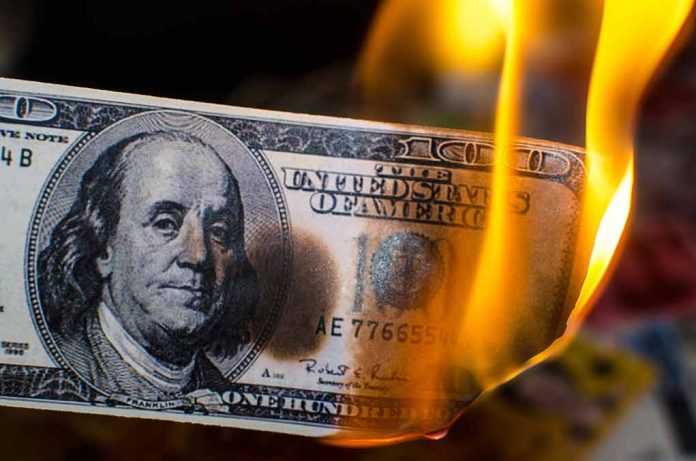
Experts warn that Americans have just 12 months or less to prepare for a potential economic collapse in 2025 or 2026, with those who follow a strategic plan having the best chance of not just surviving but thriving through the crisis.
Key Takeaways
- Financial experts recommend building a 6-12 month emergency fund immediately as the foundation of any economic collapse survival strategy
- Diversifying income streams and reducing high-interest debt are critical steps before economic conditions deteriorate further
- Tangible assets like gold, silver, and food stockpiles offer protection against inflation and supply chain disruptions
- Avoiding panic selling during market downturns while identifying strategic buying opportunities is essential for long-term wealth preservation
- Community building and practical skill development provide resilience beyond financial preparations
Building Your Financial Fortress
The cornerstone of surviving any economic collapse is establishing a robust emergency fund. Financial advisors are unanimously recommending Americans stockpile 6-12 months of living expenses in cash or highly liquid assets like money market funds currently yielding around 5%. This financial buffer prevents forced asset sales during market lows and ensures you can cover essential expenses like housing, utilities, food, and healthcare when income becomes uncertain or disappears entirely.
Debt reduction should be your next priority, with a strategic approach to different types of obligations. High-interest debts like credit cards and personal loans should be eliminated aggressively, while low-interest, fixed-rate debts like mortgages can potentially be maintained if payments remain manageable. The distinction is crucial – “bad debt” with double-digit interest rates will become increasingly burdensome as economic conditions deteriorate, while “good debt” at low fixed rates may actually become easier to service if inflation rises significantly.
Creating Multiple Income Streams
Relying on a single source of income during economic turbulence is dangerously risky. Financial experts emphasize the importance of developing diverse income streams before the collapse intensifies. This includes building passive income through dividend-paying stocks, rental properties, or digital products, as well as developing side hustles that can scale up if your primary employment becomes threatened. The goal is to create financial redundancy that can withstand sector-specific downturns.
“During economic collapses, those with multiple income streams are significantly more resilient than those dependent on a single employer. Even a modest side business generating $500-1000 monthly can be the difference between financial survival and disaster,” notes financial strategist Sam Dogen of Financial Samurai.
For those with investable assets, avoiding panic selling during market volatility will be crucial. Historical data consistently shows that markets recover after recessions, and emotional exits typically lock in losses while missing the eventual recovery. Instead, maintaining a diversified portfolio of quality investments while strategically deploying cash reserves when assets become significantly undervalued represents the optimal approach for long-term wealth preservation.
Practical Preparations Beyond Finances
Financial preparations alone won’t be sufficient if supply chains falter during an economic collapse. Experts recommend gradually building a 3-6 month supply of non-perishable food staples, essential medications, and household necessities. This stockpile should be assembled systematically over several months to avoid strain on your current budget. Basic gardening skills for growing supplemental fresh produce can further enhance your food security without requiring significant space or expertise.
Tangible assets that retain value during inflationary periods should constitute part of your preparation strategy. Financial advisors suggest allocating 5-15% of savings to inflation-resistant assets like gold, silver, or real estate. These physical assets have historically maintained purchasing power during currency devaluations and provide a hedge against the potential consequences of excessive money printing that often accompanies economic crises.
Strategic Decision-Making Framework
Creating a three-phase contingency plan is essential for navigating the uncertainty of an economic collapse. This involves mapping out your response to best-case (minimal disruption), moderate (job loss or income reduction), and worst-case (prolonged severe recession) scenarios. Each scenario should detail specific actions regarding housing, transportation, investments, and discretionary spending. Reviewing and updating this plan quarterly ensures it remains relevant as conditions evolve.
“The biggest mistake people make is failing to plan for different scenarios. Having a written strategy for various economic outcomes removes the emotional decision-making that leads to financial mistakes during crises,” explains recession planning expert Eric Shap.
Community Resilience and Skill Development
Economic collapses rarely affect everyone equally, and those with strong community connections fare significantly better. Building local networks for resource sharing, skill exchange, and mutual support provides resilience that purely individual preparations cannot. These connections can facilitate bartering, shared purchasing, and collective problem-solving when conventional economic systems falter. Conservative communities have historically excelled at this type of self-reliance during challenging times.
Developing practical skills that remain valuable during economic downturns represents another crucial preparation strategy. Focus on learning abilities that address fundamental needs – basic home repairs, food preservation, emergency medical care, and mechanical maintenance. These skills not only reduce your dependence on potentially unavailable services but can also become valuable bartering assets or income sources in a severely disrupted economy.
For long-term career stability, consider upskilling in recession-resistant sectors like healthcare, utilities, essential retail, or certain technology fields. These industries typically experience less severe contractions during economic downturns as their services remain necessary regardless of economic conditions. Having transferable skills that apply across multiple industries further enhances your employment resilience.
Optimizing Your Financial Position
A comprehensive audit of your current expenses represents a critical preparation step that should be implemented immediately. Systematically review all subscriptions, memberships, and recurring expenses to eliminate non-essentials. The freed-up cash flow should be redirected to emergency funds, debt reduction, or strategic investments. This process often reveals surprising amounts of wasteful spending that can be painlessly eliminated before economic conditions force more difficult choices.
“Most households can reduce their monthly expenses by 15-30% without significantly impacting their quality of life simply by eliminating accumulated subscription services, unused memberships, and inefficient spending habits,” notes financial advisor Warren Manna.
Insurance coverage should also be thoroughly reviewed to ensure adequate protection against catastrophic costs. Health, property, disability, and life insurance policies may need adjustments to provide appropriate coverage without unnecessary premium expenses. The goal is finding the optimal balance between protection and cost, recognizing that certain insurance becomes more crucial during economic instability while other types may become luxury expenses.
Sources:
Economic Collapse Survival Guide 2025
Three-Phase Planning for Economic Downturns
Practical Preparations for Economic Instability
Building Resilience Before Economic Collapse
Recession Preparation Checklist
How to Prepare Financially for a Recession in 2025












